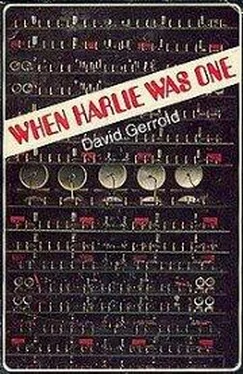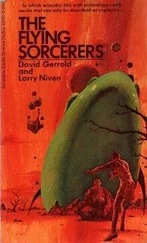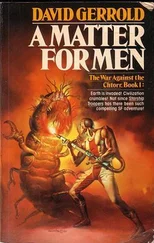David Gerrold - When HARLIE Was One
Здесь есть возможность читать онлайн «David Gerrold - When HARLIE Was One» весь текст электронной книги совершенно бесплатно (целиком полную версию без сокращений). В некоторых случаях можно слушать аудио, скачать через торрент в формате fb2 и присутствует краткое содержание. Год выпуска: 1972, ISBN: 1972, Издательство: Doubleday, Жанр: Фантастика и фэнтези, на английском языке. Описание произведения, (предисловие) а так же отзывы посетителей доступны на портале библиотеки ЛибКат.
- Название:When HARLIE Was One
- Автор:
- Издательство:Doubleday
- Жанр:
- Год:1972
- ISBN:978-0345028853
- Рейтинг книги:3 / 5. Голосов: 1
-
Избранное:Добавить в избранное
- Отзывы:
-
Ваша оценка:
- 60
- 1
- 2
- 3
- 4
- 5
When HARLIE Was One: краткое содержание, описание и аннотация
Предлагаем к чтению аннотацию, описание, краткое содержание или предисловие (зависит от того, что написал сам автор книги «When HARLIE Was One»). Если вы не нашли необходимую информацию о книге — напишите в комментариях, мы постараемся отыскать её.
Nominated for Nebula Award for Best Novel in 1972.
Nominated for Hugo Award for Best Novel in 1973.
When HARLIE Was One — читать онлайн бесплатно полную книгу (весь текст) целиком
Ниже представлен текст книги, разбитый по страницам. Система сохранения места последней прочитанной страницы, позволяет с удобством читать онлайн бесплатно книгу «When HARLIE Was One», без необходимости каждый раз заново искать на чём Вы остановились. Поставьте закладку, и сможете в любой момент перейти на страницу, на которой закончили чтение.
Интервал:
Закладка:
“Doesn’t that run into an awful lot of circuitry?”
“No. We can use the same circuits for almost any level of judgment. All the machine has to do is keep straight which is which. The machine makes a choice, decides it isn’t precise enough, shifts down one level and runs the thing through the same circuitry again. That’s compaction. It allows us to get a high degree of precision with a lot less circuitry. If Handley were here, he could explain it. Don Handley is the design engineer on the HARLIE project.”
“You can’t explain it?” asked Elzer acidly.
“I can explain what I know,” Auberson said, suddenly cautious.
“I thought you knew what HARLIE was. You are the chief of the project aren’t you?”
“I’m a research psychologist not an engineer. Anything I’ve picked up about computers, I’ve had to learn specifically on this project I—” He stopped himself. Justifications wouldn’t do any good here. He’d have to try something else. “Elzer, do you drive a car?”
The little man was startled. “Yes, of course.”
“What kind?”
“A Continental.”
“This year’s, I suppose?”
“That’s right.” He said it proudly.
“You knew that its Thorsen Auto-Pilot was one of our units, didn’t you?” He didn’t wait for an answer — it was a rhetorical question. “It was made possible by the variable-path circuits that we’ve been producing for the past four years and marketing as the Mark IV. Basically, that’s a simplified version of one type of HARLIE function module.”
“You mean HARLIE’s a giant judgment circuit?”
“HARLIE is a human brain — with solid-state circuitry instead of organic nerves. We use the judgment circuits to duplicate the human functions. The important part of the human brain is actually a series of very complex judgment paths. They don’t work exactly the same as HARLIE’s, but close enough. The difference is in mechanisms, not basic principles. If a nerve impulse is strong enough, it can trigger other nerves around it; the number of nerves reporting allows the brain to interpret the strength of the original stimulus. HARLIE’s circuits work the same way. The strength of the ‘yes’ impulses (or ‘on’ circuits) determines the interpretation. Just for HARLIE to complete one thought involves several thousand compacted judgment boxes.”
“Uh, what stage of compaction are HARLIE’s judgment boxes?” Clintwood again.
“It’s adjustable, depending on the precision HARLIE wants to bring to any one problem. Or needs to. It’s a matter of how many times a decision can be subdivided before such precision becomes redundant. He has a judgment unit to control it.”
Clintwood nodded and scratched something on his notepad.
Elzer remained unimpressed. “It’s still a computer, isn’t it?”
Auberson looked at him, frustrated by the man’s inability to understand. “Yes, in the same sense that your brain is equivalent to a toad’s.”
The reaction was immediate, a chorus of disapproving remarks. One voice, Dome’s, louder than the rest, kept insisting, “Here now!-Here now! We’ll have quiet.” As the noise subsided, he continued. “Auberson, if you can’t keep your personal opinions out of this—”
“Mr. Dome — Chairman Dome — I did not mean the comment as an insult to Mr. Elzer. I was assuming that Mr. Elzer’s brain was better , more complex than a toad’s. Assuming that he has an average human brain, he is as far above a toad as HARLIE is above a simplified autopilot judgment circuit.”
The room quieted somewhat. “However,” Auberson went on, “if Mr. Elzer feels that there is not enough difference between his brain and that of a toad, I’ll have to use some other comparison — hopefully one not so open to misinterpretation. Did you get all that, Miss Stimson?”
Miss Stimson, the Executive Secretary, looked up at him, eyes twinkling. She had gotten it.
“There is a significant difference that I might note,” he added, spacing out his words carefully. “HARLIE uses all of his brain…” Auberson waited to see if Elzer would rise to this; he didn’t. “Estimates vary, but we figure that the average human being uses only ten to fifteen percent of his available brain cells. We couldn’t afford that kind of luxury with HARLIE, so we built him to use his total brain capacity. He’s not as complex as a human brain — he has nowhere near the same number of “cells,” — but he can still function quite well at human levels. Building HARLIE taught us quite a bit about the workings of the human brain. In fact, we were surprised to find out that in many ways it’s simpler than we thought it was.
“HARLIE’s the result of a very foresighted decision made several years ago to explore the possibilities of judgment circuitry as thoroughly as possible. I’m sure I don’t have to comment on the wisdom of that decision. An on-off circuit can’t do the things a variable pattern can. It’s only the Mark IV unit that’s given us a serious piece of the computer market. That’s why we have to keep pushing. If we ever want to catch up with IBM — and such a thing is not impossible — if we ever want to catch up, we need to be the front-runner in judgment circuits. We have to continue with the HARLIE project.”
“Why?” asked Elzer. “Certainly we can continue producing judgment circuits without HARLIE.”
“We can — but that’s the sure and certain road to corporate oblivion. Look, the Thorsen Auto-Pilot is a fine little unit; it can’t be disparaged. But it’s only the equivalent of an IBM Pixie Desktop Calculator. It isn’t any more complex than that. If we want to catch up, we have to go after their JuggerNaut Series. That’s what HARLIE was originally supposed to be — the ultimate in self-programming computers.
“When Handley came on the project, though, its direction changed; the goal became even more lofty. Or maybe I should say, the way to achieve the goal involved an even greater challenge than we had originally thought. Look, you have to understand what Don was up to before he came here. He’d been doing research with a neuro-psychology team down in Houston; they’d been diagramming the basic pattern structures of the human brain. Have you ever seen the schematic of a thought? Don has. Do you know how to program a human brain? Don does. That’s what he was working on before he came here. Anyway, when they started to design HARLIE — he was called JudgNaut One then — Handley was struck by the similarity of the schematics to those of the human brain. The basic judgment paths were too much alike for the thought patterns not to be similar.
“Because the basic structures were so similar in function, Handley felt — and Digby concurred with him — that what they were building was indeed a human brain. Electronic parts, if you will, but undeniably human. Once that was realized, they worked specifically toward that end. Don sent to Houston for his notes, and soon they had a basic schematic of the total machine they wanted. They called it HARLIE and it was to be a self-programming, problem-solving device.”
“You say, ‘it was to be,’ ” said Elzer. “Isn’t it?”
“It is and it isn’t. It isn’t what the JudgNaut was supposed to be, no. But a human brain is a self-programming, problem-solving device — so they did meet the specifications of the original problem.”
“And what were you hired for? To be its baby-sitter?”
“To be its mentor. His mentor,” he corrected.
“Same thing,” snorted Elzer.
“I was brought onto the project as soon as it was realized that HARLIE would be human. Don and I worked together to plan his programming. Don was concerned with how he would be programmed — I was concerned with what .”
Читать дальшеИнтервал:
Закладка:
Похожие книги на «When HARLIE Was One»
Представляем Вашему вниманию похожие книги на «When HARLIE Was One» списком для выбора. Мы отобрали схожую по названию и смыслу литературу в надежде предоставить читателям больше вариантов отыскать новые, интересные, ещё непрочитанные произведения.
Обсуждение, отзывы о книге «When HARLIE Was One» и просто собственные мнения читателей. Оставьте ваши комментарии, напишите, что Вы думаете о произведении, его смысле или главных героях. Укажите что конкретно понравилось, а что нет, и почему Вы так считаете.












